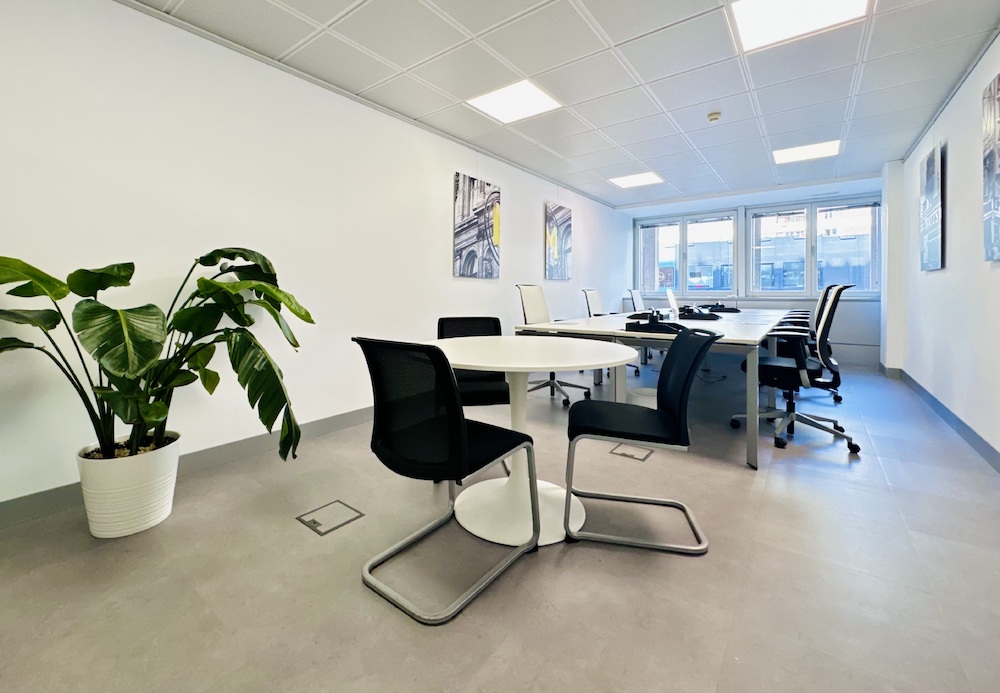Flexible working hours have become a central issue in the contemporary world of work. Companies and employees are seeking to balance professional demands with personal needs, which has led to a re-evaluation of traditional work models. In this article, we will explore in depth the advantages and disadvantages of flexitime, and how workspaces such as Ibercenter in Madrid can facilitate its effective implementation.

What is flexitime?
Flexitime refers to the ability of employees to adjust their working hours according to their personal and professional needs, rather than adhering to a fixed schedule set by the company. This can include options such as:
- Staggered schedules: where employees choose their start and end times within a set range.
- Remote working or telecommuting: allowing employees to work from locations outside the traditional office.
- Compressed working hours: working more hours in fewer days, such as a four-day work week.
These arrangements seek to adapt to the individual circumstances of workers, promoting a work-life balance.
Advantages of flexible working hours
1. Reconciliation of work and personal life
One of the main advantages is the possibility of balancing work and personal responsibilities. Employees can adapt their working day to meet family needs, medical appointments or personal activities, which contributes to greater satisfaction and well-being.
2. Increased productivity
By allowing employees to work at times when they feel most productive, performance is maximised. Some individuals are more efficient in the morning, while others perform better in the afternoon or evening. This autonomy can lead to an improvement in the quality of work and overall efficiency.
3. Reduced stress and improved health
The ability to manage one’s own time can reduce the stress associated with rigid schedules. In addition, by avoiding peak travel times, factors that contribute to physical and mental exhaustion are reduced, promoting better health.
4. Attracting and retaining talent
Companies that offer flexible working hours are often more attractive to professionals seeking a work-life balance. This can be a decisive factor when considering job offers and can increase employee loyalty and retention.
5. Reduced operating costs
For companies, flexibility can translate into lower costs associated with office maintenance, as fewer employees present at the same time require less space and resources.
6. Promoting autonomy and responsibility
Giving employees control over their schedule promotes a sense of trust and responsibility. This autonomy can motivate workers to manage their time effectively and meet their goals more efficiently.
7. Adaptability to unforeseen situations
Flexibility allows employees to adjust their working day in case of emergencies or unexpected situations, which contributes to greater personal and organisational resilience.
Disadvantages of flexitime
1. Difficulties in coordination and communication
The absence of a uniform timetable can complicate coordination between teams, especially if constant collaboration is required. This can lead to project delays and misunderstandings if effective communication channels are not established.
2. Risk of work overload
Without clear boundaries between work and personal life, some employees may feel obliged to always be available, which can lead to burnout and a diminished quality of life.
3. Feeling of isolation
Remote working or misaligned schedules can reduce social interaction between colleagues, affecting team cohesion and a sense of belonging to the company.
4. Performance appraisal
Lack of direct supervision can make it difficult to evaluate employee performance. Companies should develop metrics based on results rather than hours worked to effectively measure performance.
5. Potential inequity among employees
Not all roles within a company can accommodate flexible working hours. This can lead to perceptions of inequity among employees, affecting morale and organisational culture.
6. Dependence on technology
Flexitime often requires technological tools for communication and task management. Technical problems or lack of digital skills can hinder workflow and productivity.
7. Blurring of boundaries
Flexibility can lead to a lack of routine, making it difficult to establish clear boundaries between work and personal time, affecting employee balance and well-being.
Ibercenter: the ideal space for flexible working hours
Ibercenter, with its three locations in Madrid (Azca, Gran Vía and Velázquez), offers flexible workspace solutions that allow companies to implement flexible working hours efficiently and smoothly. With private and shared offices, coworking, virtual or home offices and meeting, training and event rooms, Ibercenter provides a professional environment adapted to the changing needs of modern workers.
- Accessibility and strategic location: located in the most emblematic areas of Madrid, Ibercenter’s offices are easily accessible by both public and private transport, optimising travel time.
- Modern and equipped infrastructure: Ibercenter offers fully equipped spaces with state-of-the-art technology, high-speed internet and ergonomic furniture.
- Flexibility of use: from private offices to shared desks, with totally flexible contracts from hours, days or months, users can choose the format that best suits their schedule and work needs.
- Services included: all-inclusive with security, ergonomic furniture, mail reception, personalised attention, cleaning and maintenance, allowing professionals to concentrate on their work without the logistical worries of renting an office from scratch.
Conclusion
Flexible working hours is a growing trend that brings numerous benefits for both employees and companies. However, for its correct implementation, it is essential to have workspaces adapted to these needs. Ibercenter is positioned as an ideal solution, providing a professional, flexible and modern environment that allows workers to make the most of the advantages of an adaptable timetable without losing efficiency or comfort.






